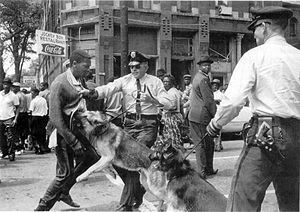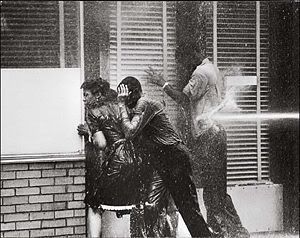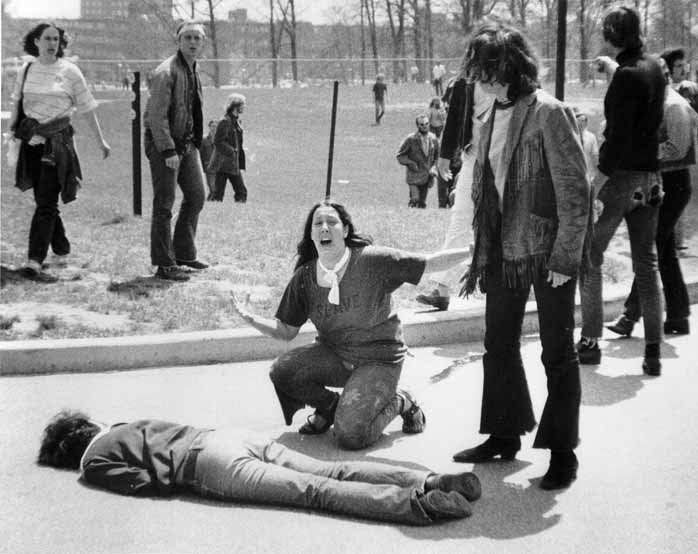(12:45PM EST – promoted by Nightprowlkitty)
OPOL asked an important question in his essay Take One Last Look.
How best to fight back people?
Please share your thoughts.
I know that many of us have been pondering an answer to that question. And for me, it has spurred many additional questions. For example, in the comments, I embedded a video from This Brave Nation of a conversation between Pete Seeger and Majora Carter. I know that a lot of you don’t have 20 minutes to watch the whole thing, but I’ve been thinking alot about the portion at about 14 minutes where Seeger talks about his experience with Martin Luther King and Rosa Parks. He tells of his disappointment when MLK chose the Montgomery Bus Boycott as his first action when there were other civil rights issues that had a far greater impact on African Americans in the mid 1950’s.
Seeger answers that question with this:
When you face an opponent over a broad front you don’t aim at the opponents strong points, you aim a little off to the side and you WIN IT. And having won the bus boycott, 13 months it took him to do it, then he moved on to other things.
Is this advice we should take today? I think that’s exactly what Buhdy was trying to do with the Maddow Movement. Can we stick to something like that for over a year before we see victory?
But frankly, a more chilling question surfaces as well. When I look at the history of demonstrations as a vehicle for change, I don’t see that the change came initially because elected officials felt the pressure of large numbers of people demonstrating.
Lets take a look for example at the first non-violent protest in this country. That would be the Iron-Jawed Angels of the suffrage movement. It was not their protests that finally created change. It was the fact that they were put in prison and force-fed through tubes that finally got the attention of the American people and led to President Wilson signing on to voting rights for women.
In terms of the civil rights movement, was it the boycotts and sit-ins that finally got attention for that cause? Or was it pictures like these?


Certainly anti-war demonstrations in the 60’s and early 70’s had huge impacts. As did a more honest media with people like Walter Cronkite. But I think, once again, it was images like this that changed the awareness of the American people.

I imagine that we could give many other examples of this both from experiences in this country and around the world. Time and time again, it is not the protest that garners attention, but the reaction of the PTB to the challenge that finally shakes people out of their complacency.
So, I have to ask if I am willing to challenge the PTB in a way that brings on that reaction. Certainly “safe” protests within the bounds of “free speech zones” do not accomplish that. And if so, am I ready to deal with that reaction.
Just questions I’m asking myself…

153 comments
Skip to comment form
Author
And this:
… is a good point. The reaction of the powers that be to challenge.
I’ll be thinking about this.
I also like the notion of aiming a little off to the side and winning.
There sure is no shortage of issues to choose from.
First, I think we must determine who exactly are the PTB.
Representatives are influenced far more by the pressures of corporate lobbyists and media rather by the pressures of civil actions. I’ve thought for some time now that mass demonstrations should occur at the headquarters of the institutions with the greatest influence on congressional decision-making rather than just in D.C. I realize that this runs a greater risk of not obtaining permits, that some trespassing/arrests/violence from “law enforcement” is more likely. But, I really think the first hurdle is to attempt to remove the barriers that media has placed between protesters and policy-makers.
I think that corporate media is the first PTB to challenge, to burst the D.C. bubble.
the U.S. government could no longer increase troop levels in Vietnam because it was felt some troops had to be kept at home to make them available to put down domestic uprisings. The size and vehemence of the anti-war movement had reached the point where it had this direct effect.
Actions are being organized now, and these efforts have been publicized here repeatedly.
I see no need for further hesitation.
Unfortunately, I haven’t looked much at this – are there any updates on how this is going?
it’s about the money.
seriously. political cocktail parties. talk about strategies like non-shopping days, shopping local and paying with cash, non-driving days and car-pooling to the plethora of little games et al…
and have site like this be the link among all the communities fighting back. sharing what works and doesn/t
like kicking the development hungry off planning board and the religiously afflicted off school boards.
and, ultimately, it’s all about the power. pure and simple. politicians can talk about hope. but i think we ought to talk about POWER. our power and how to use it.
we have ways, NOW, to flex our muscle. like a gathering storm across this country, raised with nickels, dimes, and dollars, to unseat Nancy Pelosi.
we need one big thing around which we are united. just one. not anything outlandish. something doable.
raising money across the country to oust Nancy Pelosi. and then they know we are not only serious, but can organize outside conventional politics.
it is time. to. change the game. the board. and the rules. it’s been a refrain of mine for quite some time now.
glad to see it happening.
A new, progressive political party, something that could spring from the Netroots, which I think was OPOL’s idea in the original diary’s comments and got some positive response from dharmaniacs in the comments.
I’d like us in Left Blogistan to come up with a new Port Huron Statement. And I’d like to see us thoroughly exploit the Tubes as an organizing tool. We haven’t scratched the surface on that.
Do I care where we start? Not really. Do I know how to organize this? Not really. Does that matter? Not really. I think we are all flying by the seats of our pants on this. And I think our sense of urgency will move us along in the right direction.
except an appeal to peoples’ fundamental humanity? I’ll say, again, with Kerouac “[w]ho knows, but that the universe is not one vast sea of compassion actually, the veritable holy honey, beneath all this show of personality and cruelty?”
We live in a time where the show of personality (egotism, materialism) and cruelty (abstraction of the other in its various forms) is all. We fight back every time we challenge these two modes of thinking.
Yes, it’s getting people to “attend” (as Geomoo would say) to the human modes that is difficult. I don’t think violence is necessary. Imprisonment might be. Ghandi did it.
Over at Eurotrib, poemless suggested:
In a follow-up essay, I wrote:
It’s not a big change, but it is a noticeable change and, I think, sometimes the left has an image problem because of the way we choose to present ourselves.
Look what you started.
Now that’s a f’ing ripple. Nice work. 🙂
Effective resistance snatches away the mask of civility and mutuality to make plain that one party is dominating another with force. This notion should be considered when planning effective strategy. In this case, our government is no longer responsive to the desires of the people, our government no longer defends the constitution, our government misuses and abuses it’s military, our government violates our civil rights as a matter of policy. What is the implicit threat underlying their behavior and how do we force them to make their violence manifest?
I don’t know the answers to these questions, but I do suggest they need to guide our thinking.
Also, as mentioned above, the media is not our friend. In the days of Gandhi, and even MLK, the media at least strove for objectivity. Our situation is more akin to Germany just before the Nazis were in firm control. We are hanging on to sources of information by a thread, and we are up against the most sophisticated, powerful, and population-saturating propaganda machine in history. I point that out not as a whine but a challenge.
won control of the White House and Congress. A national crisis precipitated that, and another one in the near future could generate the rapid rise of a populist party.
War with Iran, another 9/11, martial law, economic collapse–they could jump start a rapid transformation in American politics and empower a populist party to take back our government.
I just think the name of the Resistance Party is problematic, it would scare too many people. It’s goals are justified, I just think it would need a different name.
Get some musicians together (horn players mostly, I guess) and play the Darth Vader death march song in front of the Fox building in Manhattan from 845 to 930 in the morning. So they all go marching in to that song. Dum-dum-dum, dum-DAH-dum, dum-DAH-dum.
If you did it on the sidewalk, I think it’d be covered by free expression, right? It’s just a song…
Then film it and put it on youtube.
I hope this doesn’t seem too frivolous.
of civil disobedience.
Jury nullification-yes your honor I believe the Bilderburg group/Illuminati/Globo-corp does run the world and while I have to respect your authority I also doubt it.
Living totally in the theme that corporate media is the ministry of propaganda, the enemy of all mankind and Satan’s satanic workshop.
911 truth, even if you don’t fully believe it support it because it is truely pissing them off.
Don’t encourage fascism, mandatory vaccines, mandatory mandates, toxic food additives and the vacuous airheadedness of this bizzaro world US Navy commercial that is on the TeeVee right now. Oh, my fucking head hurts.
Seek out and propagate information on the cell phone brain cancer link.
Try living outside of the electronic surveillance grid, keep only one credit card, refuse “buyer reward” crap.
Promote local actions of a survivalist theme, gardens, farmers markets, barter trade, network with people who have skills. I find it surprising how much more open people have become when mentioning the New World Order theme.
So that none of us fall off the cliff we’re herding them over. 😉